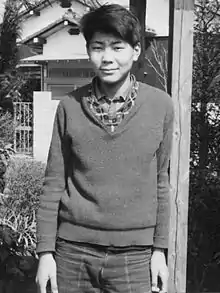| Jungo Morita | |||||
|---|---|---|---|---|---|
 Jungo Morita in 1960-2 | |||||
| Personal information | |||||
| Nationality | Japanese | ||||
| Born | August 9, 1947 Tokyo, Japan | ||||
| Height | 1.94 m (6 ft 4 in) | ||||
| Weight | 85 kg (187 lb) | ||||
| Career | |||||
| |||||
Honours | |||||
Jungo Morita (森田 淳悟, Morita Jungo, born August 9, 1947) is a retired volleyball player from Japan. He competed at the 1968 and 1972 Olympics and won a silver and a gold medal, respectively.[1] In 2003, he was inducted into the Volleyball Hall of Fame in Holyoke, Massachusetts.[2]
In 1966, Morita enrolled to the Nippon Physical Education University. The same year, he was selected for the national volleyball team and competed at the world championships, where Japan finished fifth, and at the Asian Games, where his team won the gold medal. The team was reorganized in 1966, and became much stronger within a few years, winning two Olympic medals in 1968 and 1972. Morita was a key frontline blocker, who had fast reflexes and good lateral movement, but he could also attack from the back row. He had a nickname "machine gun" because he could launch a split-second spiking attack with the setter. Morita was also known for a few other trademark attacking combinations.[2]
After retiring from competitions, Morita was appointed as professor at the Japanese Sports and Science University. Later he also became manager of the national men's volleyball team and a member of the Fédération Internationale de Volleyball (FIVB) Coaching Commission. He was selected as one of the best male volleyball players of the 20th century by the FIVB.[2]
References
- ↑ "Jungo Morita". Sports-reference.com. Archived from the original on April 17, 2020.
- 1 2 3 "Jungo Morita". Volleyball Hall of Fame. Archived from the original on October 5, 2013. Retrieved September 16, 2010.